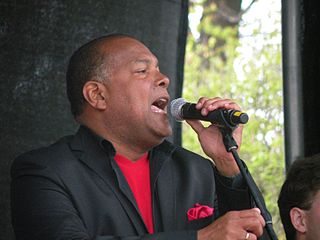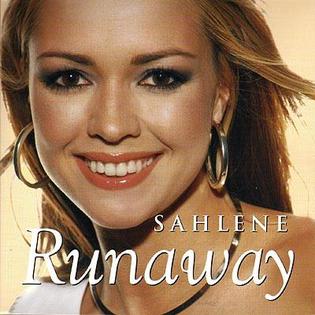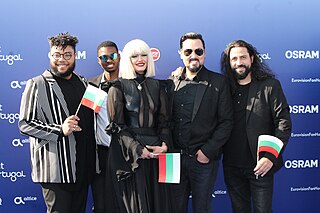
Dagmar Oja (born 8 July 1981) is an Estonian singer. [1]

Dagmar Oja (born 8 July 1981) is an Estonian singer. [1]
Oja was born in Avinurme, Jõgeva County. She graduated from the Georg Ots Music School of Tallinn, and become known as a backing singer for different pop acts of Estonia, such as Anne Veski, Maarja-Liis Ilus, Eda-Ines Etti and Ithaka Maria.
Dagmar Oja has repeatedly performed at the Eurovision Song Contest as a backing singer. In 2002 she provided backing vocals for Ira Losco who represented Malta that year, and in 2006 she did the same for Sandra Oxenryd who sang "Through My Window" for Estonia. In 2016, she provided vocal support for Jüri Pootsmann, the Estonian representative at the Eurovision Song Contest held in Stockholm, and in the 2017 contest for Koit Toome and Laura Põldvere and in 2019 for Victor Crone. She is also involved with Estonia's 2020 entry, "What Love Is".
She has been cast in stage musicals like "Billy Elliot" and "Anything Goes" as a chorus member.

Triinu Kivilaan is an Estonian vocalist and former model, best known as a former member of the popular girl group Vanilla Ninja. She had been modelling for several years when she replaced Maarja Kivi on bass in the group in 2004, having met the other members of the group a year earlier. A key factor, allegedly, in her being selected to join the group was the similarities between her and Kivi's appearance. Kivilaan was the youngest member of the group, and continued with her education despite Vanilla Ninja's busy schedule.

Dave Benton is an Aruban-born Estonian pop musician. He is one of the winners of the Eurovision Song Contest 2001. At the age of 50 years and 101 days at the time of his victory, Benton is the oldest singer ever to win Eurovision.
Estonia was represented at the Eurovision Song Contest 2006 with the song "Through My Window", written by Pearu Paulus, Ilmar Laisaar, Alar Kotkas, and Jana Hallas, and performed by Sandra Oxenryd. The Estonian participating broadcaster, Eesti Televisioon (ETV), organised the national final Eurolaul 2006 in order to select its entry for the contest. Ten songs competed in the national final and "Through My Window" performed by Sandra Oxenryd was selected as the winner by a jury panel.

"Everybody" is a song recorded by Tanel Padar and Dave Benton, along with 2XL, with music composed by Ivar Must and lyrics written by Maian-Anna Kärmas. It represented Estonia in the Eurovision Song Contest 2001 held in Copenhagen, resulting in the country's only ever win at the contest and the first victory by one of the countries that debuted in the contest in the 1990s after the fall of the Iron Curtain.

"Runaway" is a song by Sahlene, the Eurovision 2002 entrant for that year's host nation, Estonia.

Evelin Samuel is an Estonian singer, songwriter, musical theater performer, author of children's books and participant in the Eurovision Song Contest.

The Hearts of Soul, also known as Dream Express and LBS, were a Dutch-Belgian musical group that originally consisted of the Indonesian-born Dutch sisters Bianca, Patricia and Stella Maessen. Belgian singer and composer Luc Smets joined the group in 1975. The group is known for representing the Netherlands in the Eurovision Song Contest 1970 and Belgium in the Eurovision Song Contest 1977.

Kaire Vilgats is an Estonian vocalist and actress, known for numerous roles in stage musicals. Over the years, she has repeatedly participated in the Eurovision Song Contest as a backing vocalist for Estonian entries.

Urban Symphony is an Estonian music group. It represented Estonia in the Eurovision Song Contest 2009 with the song "Rändajad", finishing in 6th place with 129 points. In doing this, they achieved Estonia's best placement since 2002.

Maian-Anna Kärmas is an Estonian singer, songwriter, and journalist.
Estonia participated in the Eurovision Song Contest 2014 with the song "Amazing" written by Timo Vendt and Tanja. The song was performed by Tanja. The Estonian broadcaster Eesti Rahvusringhääling (ERR) organised the national final Eesti Laul 2014 in order to select the Estonian entry for the 2014 contest in Copenhagen, Denmark. The national final consisted of three shows: two semi-finals and a final. Ten songs competed in each semi-final and the top five from each semi-final as determined by a jury panel and public vote qualified to the final. In the final, the winner was selected over two rounds of voting. In the first round, a jury panel and a public vote selected the top two to qualify to the superfinal. In the superfinal, "Amazing" performed by Tanja was selected as the winner entirely by a public vote.
Estonia participated in the Eurovision Song Contest 2015 with the song "Goodbye to Yesterday" written by Stig Rästa. The song was performed by Elina Born and Stig Rästa. The Estonian broadcaster Eesti Rahvusringhääling (ERR) organised the national final Eesti Laul 2015 in order to select the Estonian entry for the 2015 contest in Vienna, Austria. The national final consisted of three shows: two semi-finals and a final. Ten songs competed in each semi-final and the top five from each semi-final as determined by a jury panel and public vote qualified to the final. In the final, the winner was selected over two rounds of voting. In the first round, a jury panel and a public vote selected the top three to qualify to the superfinal. In the superfinal, "Goodbye to Yesterday" performed by Elina Born and Stig Rästa was selected as the winner entirely by a public vote.

Uku Suviste is an Estonian singer-songwriter, pianist and music producer. He was scheduled to represent Estonia in the Eurovision Song Contest 2020 in Rotterdam, Netherlands, before cancellation of the competition that year. Instead, he represented Estonia in the Eurovision Song Contest 2021.
Estonia participated in the Eurovision Song Contest 2016 with the song "Play" written by Fred Krieger, Stig Rästa and Vallo Kikas. The song was performed by Jüri Pootsmann. The Estonian broadcaster Eesti Rahvusringhääling (ERR) organised the national final Eesti Laul 2016 in order to select the Estonian entry for the 2016 contest in Stockholm, Sweden. The national final consisted of three shows: two semi-finals and a final. Ten songs competed in each semi-final and the top five from each semi-final as determined by a jury panel and public vote qualified to the final. In the final, the winner was selected over two rounds of voting. In the first round, a jury panel and a public vote selected the top three to qualify to the superfinal. In the superfinal, "Play" performed by Jüri Pootsmann was selected as the winner entirely by a public vote.
Estonia participated in the Eurovision Song Contest 2017 with the song "Verona" written by Sven Lõhmus. The song was performed by Koit Toome, who had previously represented Estonia in the Eurovision Song Contest in 1998 where he placed twelfth with the song "Mere lapsed", and Laura, who had previously represented Estonia in the Eurovision Song Contest in 2005 as part of the group Suntribe where she failed to qualify to the final with the song "Let's Get Loud". The Estonian broadcaster Eesti Rahvusringhääling (ERR) organised the national final Eesti Laul 2017 in order to select the Estonian entry for the 2017 contest in Kyiv, Ukraine. The national final consisted of three shows: two semi-finals and a final. Ten songs competed in each semi-final and five from each semi-final as determined by a jury panel and public vote qualified to the final. In the final, the winner was selected over two rounds of voting. In the first round, a jury panel and a public vote selected the top three to qualify to the super final. In the super final, "Verona" performed by Koit Toome and Laura was selected as the winner entirely by a public vote.

"Verona" is an English-language song performed by Estonian singers Koit Toome and Laura.

Equinox was a supergroup consisting of Bulgarian singers Zhana Bergendorff, Georgi Simeonov, and Vladimir Mihaylov, and American singers Johnny Manuel and Trey Campbell. They represented Bulgaria in the Eurovision Song Contest 2018 in Lisbon with the song "Bones", coming 14th with 166 points. The group has been inactive after the contest.
Estonia participated in the Eurovision Song Contest 2019 with the song "Storm" written by Stig Rästa, Vallo Kikas, Victor Crone and Fred Krieger. The song was performed by Victor Crone. The Estonian broadcaster Eesti Rahvusringhääling (ERR) organised the national final Eesti Laul2019 in order to select the Estonian entry for the 2019 contest in Tel Aviv, Israel. The national final consisted of three shows: two semi-finals and a final. Twelve songs competed in each semi-final and six from each semi-final as determined by a jury panel and public vote qualified to the final. In the final, the winner was selected over two rounds of voting. In the first round, a jury panel and a public vote selected the top three to qualify to the superfinal. In the superfinal, "Storm" performed by Victor Crone was selected as the winner entirely by a public vote.

"Storm" is a song performed by Swedish singer Victor Crone. It was co-written/produced by Electronic Producer duo Kisma. The song represented Estonia at the Eurovision Song Contest 2019 in Tel Aviv. It was performed during the first semi-final on 14 May 2019, and qualified for the final, where it finished in 20th place with 76 points.

"What Love Is" is a song by Uku Suviste that was to represent Estonia in the Eurovision Song Contest 2020 in Rotterdam, The Netherlands, before the cancellation of the event due to the Coronavirus Pandemic. It was written by Suviste and Sharon Vaughn. During the live performance at Eesti Laul, Uku was accompanied by five backing singers off-stage, Kaire Vilgats, Dagmar Oja, Kaarel Orumägi, Raimondo Laikre and Scott Murro.